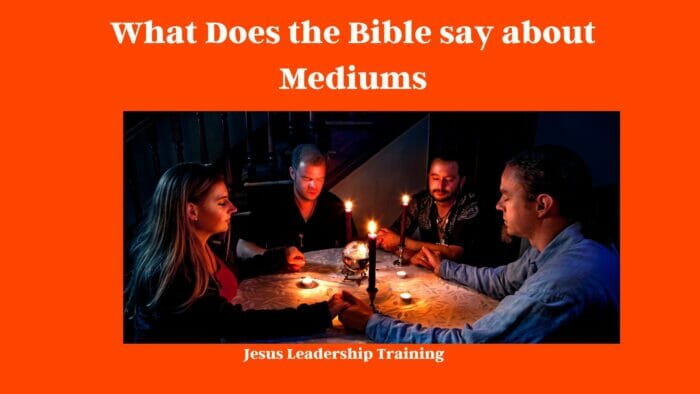What Does the Bible say about Mediums – In the context of the Bible, a medium (sometimes referred to as a “spiritist”) is generally understood as a person who professes to communicate with the dead, or channel spirits or other non-physical entities. This might involve seeking advice, foretelling the future, or otherwise obtaining information that is not accessible through normal means.
Table of Contents
What Does the Bible say about Mediums
What does the Bible say about mediums? This age-old question has sparked curiosity and debate among believers and non-believers alike. As people seek answers to life’s most profound questions, it’s natural to turn to spiritual sources for guidance. In this comprehensive article, we’ll examine the Bible’s stance on mediums, supernatural communication, and the implications for modern society.
The Bible explicitly warns against consulting mediums, viewing such practices as incompatible with a faithful relationship with God. Here are some key verses:
- Leviticus 19:31: “Do not turn to mediums or seek out spiritists, for you will be defiled by them. I am the LORD your God.”
- Deuteronomy 18:10-12: “Let no one be found among you who sacrifices their son or daughter in the fire, who practices divination or sorcery, interprets omens, engages in witchcraft, or casts spells, or who is a medium or spiritist or who consults the dead. Anyone who does these things is detestable to the LORD; because of these same detestable practices the LORD your God will drive out those nations before you.”
- Isaiah 8:19: “When someone tells you to consult mediums and spiritists, who whisper and mutter, should not a people inquire of their God? Why consult the dead on behalf of the living?”
- 1 Chronicles 10:13-14: “Saul died because he was unfaithful to the LORD; he did not keep the word of the LORD and even consulted a medium for guidance, and did not inquire of the LORD. So the LORD put him to death and turned the kingdom over to David son of Jesse.”
In essence, the Bible urges believers to seek guidance and wisdom directly from God, rather than attempting to communicate with the dead or engage in spiritism. It views such practices as a form of idolatry, diverting reverence and trust that should be directed towards God alone.
Etymology of the Biblical Word Medium: Exploring Its Origins
The Bible is filled with rich language and deep spiritual meaning, and one word that stands out is “medium”. In this blogpost, we’ll explore the etymology of the word and how it has been used throughout the ages.
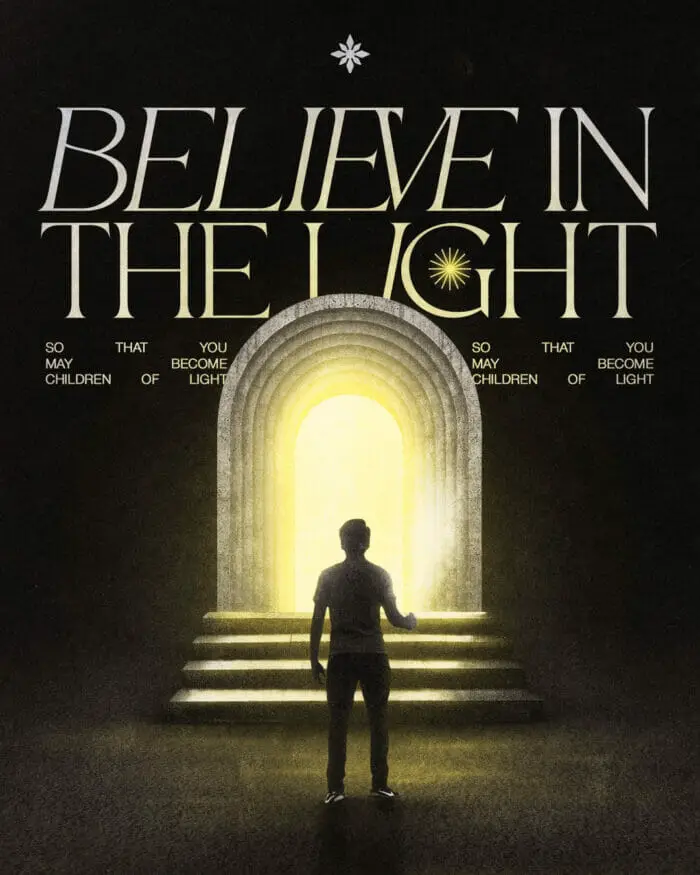
Origin
The origin of the word “medium” is from the Latin “medius”, which means “middle” or “in between”. This reflects the idea that mediums are those who work between the physical and spiritual worlds. In the Bible, the term is used to refer to those who mediate between God and humans.
Hebrew
In Hebrew, the term “medium” is translated as “navon”, which also means “in between”. This reflects the idea that mediums are those who bridge the gap between the physical and spiritual worlds.
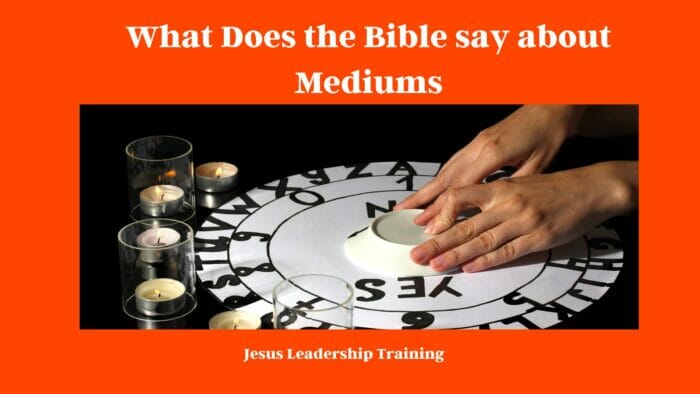
Greek
In Greek, the term “medium” is translated as “metron”, which means “measure” or “means”. This reflects the idea that mediums are those who provide a means of communication between the physical and spiritual worlds.
Aramaic
In Aramaic, the term “medium” is translated as “navi”, which means “prophet”. This reflects the idea that mediums are those who are inspired by God and can provide guidance and wisdom.
Warnings
The Bible contains many warnings about consulting mediums and engaging in occult practices. In Deuteronomy 18:10-14, God warns his people to stay away from mediums and those who practice divination. This warning is still relevant today, as engaging in occult activities can be dangerous and lead to spiritual deception and even demonic activity.
Occult
The term “occult” is derived from the Latin “occultus”, which means “hidden” or “secret”. This reflects the idea that occult practices involve activities that are hidden or secret, such as divination, astrology, and magic. In the Bible, occult practices are strongly discouraged and are often associated with demonic activity.
The word “medium” is deeply rooted in biblical language and has a long history of usage. It reflects the idea that mediums are those who serve as a bridge between the physical and spiritual worlds. While the Bible warns against consulting mediums and engaging in occult practices, it is important to remember that the term has a long and rich history and should not be viewed in a negative light.
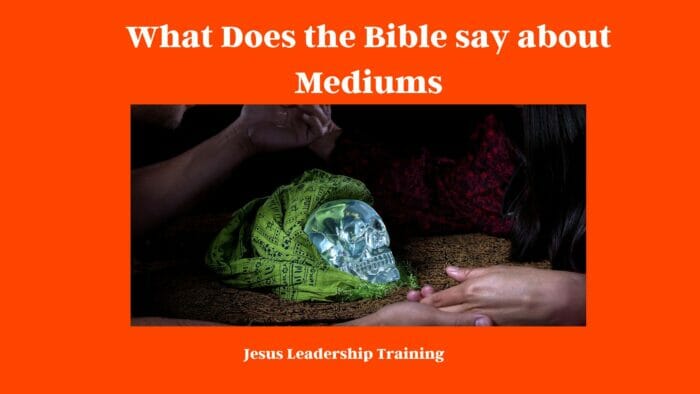
What Does the Bible Say About Mediums?
Old Testament Condemnation of Mediums
The Old Testament is quite clear in its disapproval of mediums and spiritualism. Let’s explore a few passages that highlight this stance:
- Leviticus 19:31: This verse warns against seeking out mediums or wizards, as they defile a person and separate them from God.
- Leviticus 20:6: God directly states that He will set His face against those who turn to mediums, cutting them off from His people.
- Deuteronomy 18:10-12: These verses list the practices of divination, witchcraft, and consulting with the dead as detestable to the Lord.
It’s evident that the Old Testament strongly condemns the use of mediums, associating such practices with sin and spiritual impurity.
New Testament Warnings
While the New Testament is less explicit in its condemnation of mediums, there are still passages that caution against engaging with supernatural forces:
- Acts 16:16-18: The story of Paul and Silas encountering a slave girl with a spirit of divination emphasizes that such powers are not from God and should be cast out.
- 1 John 4:1-3: John encourages believers to test spirits to determine whether they are from God, as many false prophets and deceptive spirits exist in the world.
Clearly, the New Testament also cautions believers against seeking guidance from supernatural sources other than God.
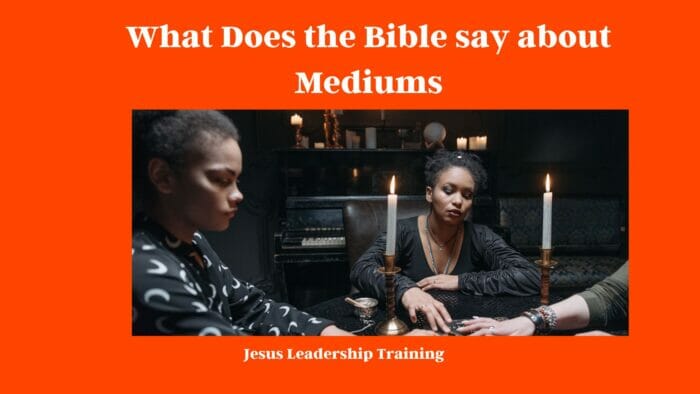
6 Reasons the Bible warns us to Avoid the Occult
- Deuteronomy 18:10-12 warns us to avoid the occult because it involves “detestable practices” and “abominations” which the Lord hates. We are told to not let anyone be found among us who practices divination or sorcery, interprets omens, engages in witchcraft, or casts spells, or who is a medium or spiritist or who consults the dead.
- Leviticus 19:26-31 warns us to stay away from the occult because it involves consulting mediums and spiritists. We are told to not turn to mediums or seek out spiritists, because whoever does these things is detestable to the Lord.
- Galatians 5:19-21 warns us not to practice the works of the flesh, which include things like sorcery, divination, and witchcraft. We are warned not to get involved in these activities, because they come from the “evil one” and can lead us away from the Lord.
- Ephesians 5:11 warns us to have nothing to do with the “fruitless deeds of darkness” which includes things like sorcery, divination, and witchcraft. We need to expose these things for what they really are and have nothing to do with them.
- Isaiah 8:19-20 warns us to not consult mediums and spiritists, because they speak from the “depths of the grave” and are not from God. We are to trust in the Lord and not turn to those who practice the occult.
- Acts 19:18-20 warns us to stay away from the occult because it involves “strange arts” and can lead us away from the Lord. We are told to not even touch or go near any of these things, because they are not of God.
Historical Context of Biblical Teachings
Understanding the historical context of the Bible’s teachings on mediums can shed light on the reasons behind its disapproval.
The story of Saul’s interaction with a medium has long been a source of controversy among biblical scholars. Some believe that God allowed Saul to consult the medium in order to demonstrate the consequences of turning away from God. Others believe that Saul’s interaction with the medium was a sign of God’s mercy, as Saul was given a chance to repent before his death.
Regardless of which interpretation is correct, one thing is clear: God does not condone the use of mediums. In fact, the Bible states that those who consult mediums are engaging in spiritual prostitution. This means that the act of consulting with a medium is an offense that is punishable in God’s eyes.
Examining God’s Consent of Mediums in the Bible
Despite God’s warnings against the use of mediums in the Bible, it is clear that He does not entirely condemn their use. In fact, God often uses mediums to communicate His will to His people. For example, God sent a medium to warn King Ahaziah of his impending death (2 Kings 1:2-4). Similarly, God allowed the mediums Balaam and the Witch of Endor to communicate His messages to the people of Israel.
These examples demonstrate that God does not always condemn the use of mediums, and in some cases, He allows them to communicate His will. This implies that God may be open to the use of mediums, as long as it is done in accordance with His will.
How Jesus Views the Role of Mediums
The Bible does not provide any direct information on how Jesus views the role of mediums. However, the fact that Jesus never explicitly condemned the use of mediums implies that he may have been open to their use. This is further supported by the fact that Jesus performed many miracles, which could be seen as a form of spiritual communication.
Furthermore, Jesus spoke about the importance of communicating with spirits in the afterlife, which implies that he was open to the possibility that mediums could be used for this purpose. Thus, it is likely that Jesus was not entirely opposed to the use of mediums, though he did not necessarily condone their use either.
Exploring the Bible’s Teachings on Mediums
In conclusion, the Bible does not explicitly condemn the use of mediums, but it does warn against their use and states that those who consult mediums are engaging in spiritual prostitution. Furthermore, God sometimes uses mediums to communicate His will to His people, which implies that He may be open to the use of mediums in certain circumstances. Finally, Jesus’ own words and actions imply that he was open to the possibility that mediums could be used for spiritual communication.
Therefore, while the Bible does not condone the use of mediums, it does not entirely condemn them either. Ultimately, it is up to each individual to decide how they feel about the use of mediums and to seek out God’s guidance on this issue.
Pagan Practices and Idolatry
In ancient times, many pagan cultures practiced divination and communicated with spirits as part of their religious rituals. The Bible’s condemnation of these practices likely served to distinguish the Israelites from surrounding pagan societies, emphasizing their devotion to the one true God.
Protection from Deceptive Spirits
The Bible warns against deceptive spirits and false prophets, which may have been a practical measure to protect the Israelites from spiritual deception and manipulation.
Modern Implications of Biblical Teachings
In today’s world, the question “What Does the Bible say about Medium?” still holds relevance. Many people continue to seek guidance from psychics, mediums, and spiritualists, often unaware of the biblical warnings against such practices. As Christians, it’s essential to understand these teachings and make informed decisions about engaging with supernatural forces.
List of 6 Types of the Occult that is common Today
While interpretations can vary across different Christian denominations and individual beliefs, the Bible generally warns against practices associated with the occult or spiritualism that it suggests are outside of God’s will. Here are some practices that might be considered occult and are commonly referenced today, which some biblical passages caution against:
- Divination: This includes practices such as tarot card reading, palmistry, and the use of crystal balls or other methods to predict the future. (Deuteronomy 18:10)
- Astrology: Although modern astrology is largely seen as a form of entertainment, some Christians interpret the Bible as warning against it because it seeks answers from the stars rather than God. (Isaiah 47:13-14)
- Sorcery/Witchcraft: This can encompass a wide variety of practices, but generally refers to attempts to manipulate the natural world through supernatural means, often using spells or rituals. (Galatians 5:19-21)
- Necromancy: Communicating with the dead, such as through séances or mediums, is generally seen as forbidden. (Deuteronomy 18:11)
- Idolatry: The worship of idols or false gods. This can be broadly interpreted to include anything that is placed in higher importance than God, including money, fame, or power. (1 Corinthians 10:14)
- Spiritism/Spiritualism: This can include practices such as channeling spirits, using Ouija boards, or participating in other rituals designed to communicate with the spirit world. (Leviticus 19:31)
- Black Magic: The use of supernatural powers for evil or selfish purposes, often associated with the devil or demons. (Acts 19:19)
- Occult Imagery/Symbols: Some people interpret the Bible as warning against the use of occult symbols or imagery, such as pentagrams or other signs associated with witchcraft or pagan religions. (Exodus 20:4)
Remember, interpretations can vary widely, and this list is not exhaustive. Many of these practices are part of other religious traditions or are seen as harmless by those who use them. It is always important to approach these subjects with respect for others’ beliefs.
Should Christians Consult Mediums?
Given the Bible’s clear stance against mediums and spiritualism, Christians should exercise caution when considering engaging with such practices. It’s crucial to prioritize a relationship with God, seeking His guidance through prayer, and studying scripture.
Discerning Truth from Deception
As believers, it’s essential to test spiritual experiences and teachings against the Word of God to discern truth from deception. The Bible encourages us to be vigilant and discerning, guarding our hearts and minds against deception and manipulation.
Ways Christians can avoid being Lured into the Occult
- Understand Christian Doctrine: The first and most important step to avoid being lured into occult practices is to have a deep understanding of your faith as a Christian. Study the Bible, learn about its teachings, and strive to comprehend the nature of God and Jesus Christ’s life, teachings, and sacrifice. Understanding Christian doctrine will provide a solid foundation of faith and can act as a deterrent against occult attractions. The apostle Paul encourages in Ephesians 6:17 to “take the helmet of salvation and the sword of the Spirit, which is the word of God.”
- Prayer and Spiritual Disciplines: Regular prayer and other spiritual disciplines like fasting and meditation on scriptures can deepen your connection with God and make you more resistant to occult allurements. Prayer is a powerful tool in maintaining spiritual strength and focus. In Philippians 4:6, Paul writes, “Do not be anxious about anything, but in every situation, by prayer and petition, with thanksgiving, present your requests to God.”
- Find a Supportive Christian Community: Surrounding yourself with a supportive Christian community can also help you resist the lure of the occult. This community can provide you with strength, encouragement, and accountability. Participate in church activities, small group studies, and volunteer opportunities. The early Christian community described in Acts 2:42-47 is a great example of how believers can support each other.
- Educate Yourself About the Occult: Knowing about the occult and its practices can help you to better recognize and avoid them. While it is not necessary or beneficial to delve too deeply into these practices, a basic understanding can help you discern what is in line with Christian teaching and what is not. However, this should be done with caution and discernment to prevent fascination or undue exposure.
- Guard Your Mind: Be cautious of what you allow into your mind. This includes books, music, movies, and even the people you associate with. Many occult influences can seep into our lives through popular culture or peer pressure. As Philippians 4:8 states, “Finally, brothers and sisters, whatever is true, whatever is noble, whatever is right, whatever is pure, whatever is lovely, whatever is admirable—if anything is excellent or praiseworthy—think about such things.”
- Consult Christian Counselors or Leaders: If you have questions or doubts, seek guidance from mature Christians, church leaders, or Christian counselors. They can provide wisdom and biblical perspectives to help you navigate your concerns.
- Live a Christ-Centered Life: Strive to live a life that is centered on Christ and His teachings. This means prioritizing love, compassion, kindness, and humility. When your life is centered on Christ, it leaves less room for other influences. As Paul said in Galatians 2:20, “I have been crucified with Christ and I no longer live, but Christ lives in me.”
- Understand the Power of God: Understand that as a Christian, you believe in a God who is omnipotent, omniscient, and omnipresent. Therefore, there is no need to seek power or knowledge from other sources, especially not from occult practices. Remember the words of Paul in Romans 8:31, “If God is for us, who can be against us?”
In all of these steps, it is important to remember that the goal is not just to avoid the occult, but to deepen your relationship with God and align yourself more closely with His will. This involves daily choices to pursue God and live according to His teachings.
FAQs
1. What Does the Bible say about Medium?
The Bible generally disapproves of mediums, spiritualism, and seeking guidance from supernatural sources other than God. Both the Old and New Testaments contain warnings and condemnations against these practices.
2. Why does the Bible condemn mediums and spiritualism?
The Bible’s condemnation of mediums and spiritualism can be attributed to several factors, including the need to distinguish the Israelites from surrounding pagan societies, protection from spiritual deception and manipulation, and the importance of seeking guidance from the one true God.
3. Can Christians attend psychic readings or engage with mediums for entertainment purposes?
While the Bible does not explicitly address this specific scenario, it’s essential for Christians to exercise discernment and caution when considering engaging with mediums, even for entertainment. It’s crucial to prioritize a relationship with God and seek His guidance through prayer and studying scripture.
4. How can Christians discern truth from deception when encountering spiritual experiences or teachings?
Christians can discern truth from deception by testing spiritual experiences and teachings against the Word of God. The Bible encourages believers to be vigilant and discerning, guarding their hearts and minds against deception and manipulation.
5. Is there a difference between the Old and New Testament’s teachings on mediums?
While the Old Testament is more explicit in its condemnation of mediums and spiritualism, the New Testament also contains passages that caution against engaging with supernatural forces. Both testaments emphasize the importance of seeking guidance from God rather than other spiritual sources.
6. Are all supernatural experiences evil or against God’s will?
Not all supernatural experiences are inherently evil or against God’s will. However, Christians should approach such experiences with discernment and test them against the teachings of the Bible to determine their origins and validity.
Final Thoughts – What Does the Bible say about Medium
In conclusion, the Bible’s teachings on mediums and spiritualism remain relevant in today’s society, as many people continue to seek guidance from supernatural sources. By understanding the biblical perspective on mediums, Christians can make informed decisions about engaging with supernatural forces and prioritize their relationship with God. Ultimately, discernment and vigilance are key to navigating the spiritual landscape and guarding against deception and manipulation.



